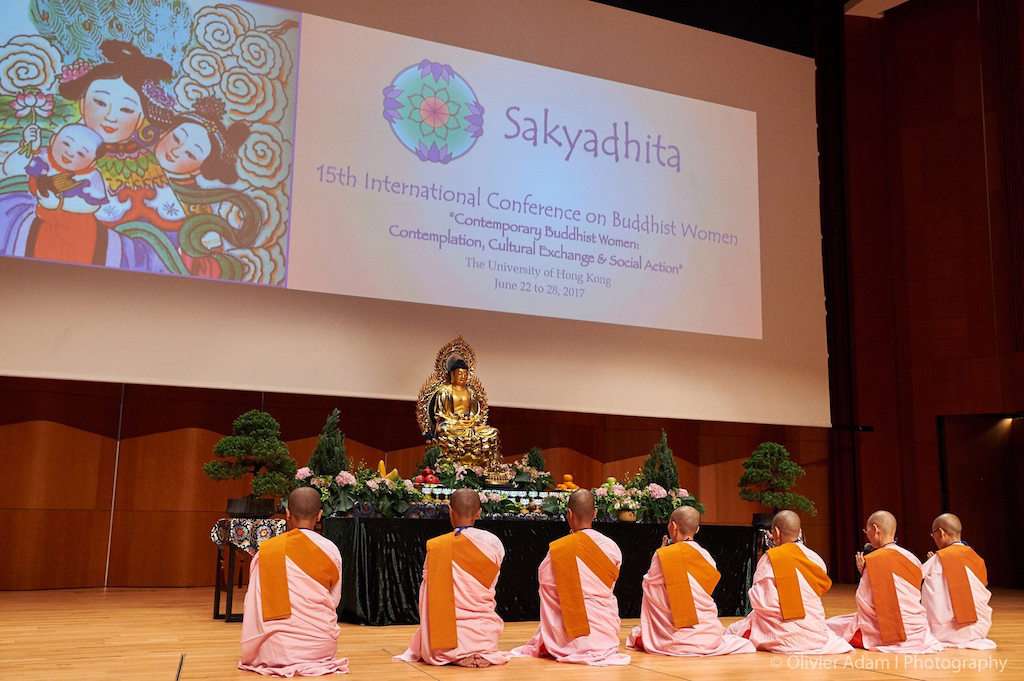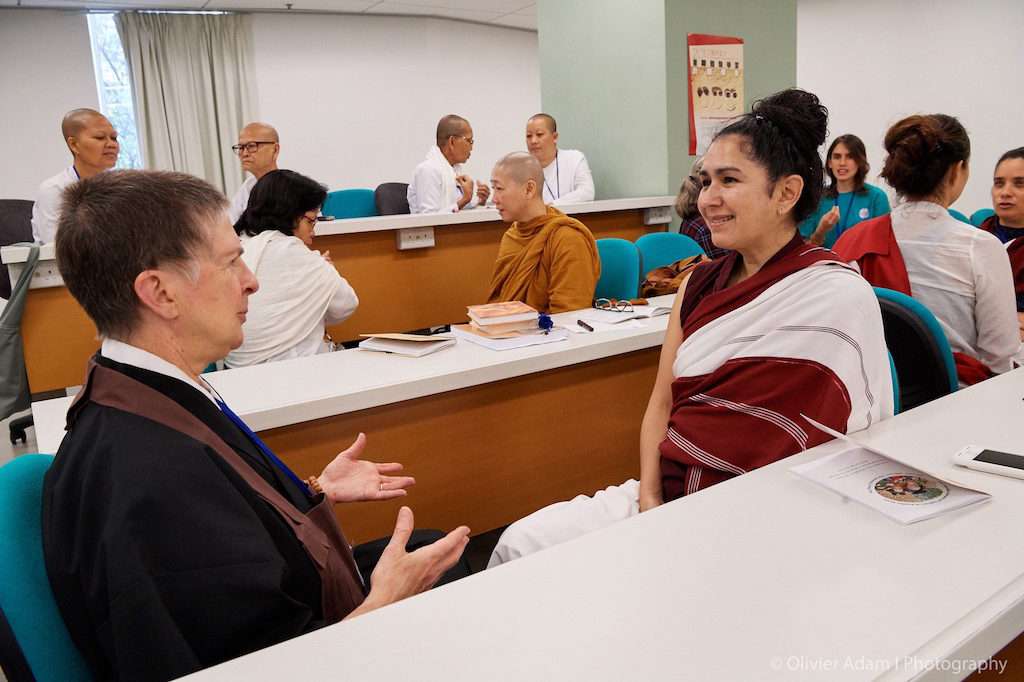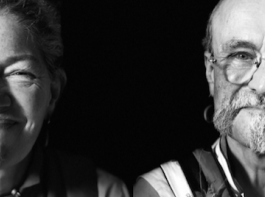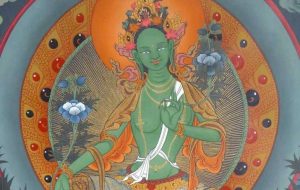
The Sakyadhita International Association of Buddhist Women’s 15th conference, “Contemporary Buddhist Women: Contemplation, Cultural Exchange and Social Action,” was held on 22–28 June at The University of Hong Kong (HKU). The conference was jointly organized by Sakyadhita and HKU’s Centre of Buddhist Studies (CBS), with the objective of addressing the diversity of contemporary Buddhist women throughout the world. As a research student at CBS, I was privileged to have a chance to be an audience member in this conference, which had more than 800 participants from 31 countries.
I first heard about the conference two years ago, when I attended the 14th Sakyadhita Conference, “Compassion and Social Justice,” held from 22–30 June 2015 in Yogyakarta, Indonesia. I presented a paper titled “Controversies and Prospects: Issues Surrounding the Establishment of the Female Monastic Sangha in Bangladesh.” I was eager to draw attention to the urgency of recognizing female Buddhist monastics who were neglected by the Supreme Sangha Council of Bangladesh. Thanks to the incredible effort made by Bangladeshi female monastics, there are now a number of nuns who have received full ordination and established the bhikkhuni order, and they are serving as shining examples for future generations of female practitioners.
Conference participants shared their personal interests both in the activist and academic fields, including meditation, philosophy, psychology, social advocacy, and the arts. In all, delegates presented 51 papers and 78 workshops. The first day of the conference began with a chanting ceremony from the Theravada, Chinese, Korean, Tibetan, Vietnamese, and Tibetan traditions. The ceremonial speeches were delivered by Jetsunma Tenzin Palmo, president of SIABW, Professor C.F. Lee, founding fellow of CBS, Venerable Kuen Yun, executive vice president of the Hong Kong Buddhist Association, Buddhistdoor Global associate editor Anne Wisman (on behalf of Florence Hui, undersecretary for home affairs), Professor Karma Lekshe Tsomo, representative for international Buddhist women, and Venerable Fa Ren, who represented Hong Kong Buddhist women.

After the opening ceremony, Professor Rongdao Lai, assistant professor of religion at the University of Southern California, delivered the keynote speech titled “Strength in Diversity: Toward an Inclusive Dialogue on Social Action,” which addressed a different form of diversity—ecumenical Buddhism. In the presentation, Rongdao said: “Wholeheartedly embracing this diversity and richness leads to creativity, empathy, strength, and truly meaningful social action. Sakyadhita is an ideal platform for such dialogue and exchange.” (SIABW, Program Schedule, 5)
The first session of the conference was titled “Buddhist Women Across Cultures,” and was subsequently followed by the sessions “Buddhist Women of Hong Kong,” “Mindfulness Across Cultures,” “Building Healthy Families and Communities,” “Buddhism and Social Action,” “The Future of Buddhist Education,” “Female Images of Enlightenment,” “Gender Equality: Only a Dream? Or, Are Buddhist Really Equal?” “Monastic Life in the Modern World,” “Religious Status of Women Buddhist Practitioners,” “Western Buddhist Women: Tradition and Interpretation,” and “Stereotypes, Regulations, and Obstacles.”
During session two, Ching Kwaong-shuen, Lam Kam-kong, Ven. Chuan Deng, and Ven. Fa Ren presented papers titled, “The Perfection of Filial Piety in Buddhism: A Study of Lady Clara Ho’s Social Welfare Activities in Hong Kong,” “A Frugal and Generous Life: Bhiksuni Chi Cheung’s Commitment to Popular Education,” “The Work of Bhikkhuni Yin Yeang,” and “Breaking the Boundary: The Transformation of Buddhist Nuns in Contemporary Hong Kong” respectively.
Ven. Fa Ren finished her presentation by highlighting the future of Hong Kong Buddhist nuns. “Nowadays, a large number of Buddhist nuns are actively involved in teaching Buddhism and giving Dharma talks,” she noted. “In addition to offering public lectures, teaching Buddhist studies, and explaining sutras, they also promote Buddhism through various channels, including the Internet, radio, and lectures at universities. Nuns are no longer relegated to a passive, subordinate position; now they play leading roles in organizing ritual events and teaching Buddhism. These significant changes in the nuns’ roles reflect shifts in social relationships, negotiations within extant power structures, and changes in gender roles within Buddhist institutions.” (Tsomo 49)

On 27 June, Lozan Tsenten, Karma Lekshe Tsomo, Yeshe Bodhicitta, Thubten Choedroen Namgyal Chokyi, and Yeshe Metog presented papers under the session “Western Buddhist Women: Traditions and Interpretation.” Venerable Tsomo presented on “Expanding Enlightenment Awareness: Women in the Transmission and Indigenization of Buddhism in Brazil.” She said that in the late 19th century, Japanese immigrants brought Buddhism to Brazil and Buddhist temples were established rapidly. However, by the latter half of the 20th century, Theravada, Chinese Mahayana, Zen, and Tibetan Vajrayana Buddhism had significantly shaped the Buddhist practice of Brazil. As a result, in recent decades, women are very much engaged in various Buddhist activities. But she underlined that the future of Buddhist women in Brazil is still uncertain.
Venerable Tsomo hopes that women are ensuring the healthy development of Buddhism in Brazil for two significant reasons: “First, women in Brazil are generally well educated, giving them a strong foundation for learning Buddhism. Second, they have access to Buddhist teachings and practices from a diversity of Buddhist temple and practice centers.” (Tsomo 255) I personally felt very much encouraged as I support the empowerment of women in every aspect of our society. In contemporary Theravada Buddhist society, the question of nuns is a shared problem, and many like me feel that forces within the community of male monastics have consistently ignored women’s empowerment from various religious implementations including the full ordination.
On each day of the conference, the evening chanting was conducted in Pali, Chinese, Korean, Tibetan, and Vietnamese. On 24 and 26 June, two Dhamma talks “Cave or Community: Some Reflections” and “Nourishing a Healthy Heart in Modern Society” were given by Jetsunma Tenzin Palmo and Daw Yuzana Nyani respectively. The conference ended with a series of cultural and musical events. The schedule was also packed with a range of workshops and meditations, along with a two-day tour to Lantau Island and other cultural attractions.

References
Tsomo, Karma Lekshe. 2017. Contemporary Buddhist Women: Contemplation, Cultural Exchange and Social Action. Hong Kong: The University of Hong Kong.
SIABW (Program Schedule). 2017. Sakyadhita: 15th International Conference on Buddhist Women. Hong Kong: The University of Hong Kong.
See more
15th Sakyadhita International Conference (SIABW Website)
15th Sakyadhita International Conference (15th Sakyadhita International Conference Facebook)
Related news from Buddhistdoor Global
Press Update: 15th Sakyadhita Conference Begins in Hong Kong
15th Sakyadhita International Conference On Buddhist Women To Be Held in Hong Kong From 22–28 June 2017
Sakyadhita to Host 15th International Conference at The University of Hong Kong
Daughters of Buddhism in Thailand Find Growing Acceptance in the Face of Official Disapproval
Related features from Buddhistdoor Global
Anukampa Bhikkhuni Project: Nuns’ Monastery Set to Become Reality
The 2,600th Anniversary of the Global Bhikkhuni Sangha and Fourfold Sangha of the Buddha
The Journey of Women Going Forth into the Bhikkhuni Order in Bangladesh
Life in the Red – The Long Journey to Really Being Daughters of the Buddha
Anukampa Bhikkhuni Project: The First Buddhist Nunnery in the UK
Reflections from the 14th Sakyadhita International Conference: Nurturing the Theravada Bhikkhuni Sangha
“There’s a lot of catching up to do” – Full Interview with Karma Lekshe Tsomo
The Legality of Ordaining Nuns according to Buddhist Law











